External cladding is an essential part of a building's exterior, providing both aesthetic appeal and protection. Over time, dirt and grime can accumulate on the cladding, impacting its appearance and potentially causing damage. In this article, we will explore the importance of cleaning external cladding, the common issues that arise from neglect, the tools and equipment needed for the job, and a step-by-step guide on how to effectively clean different types of cladding materials. We will also discuss tips for maintaining clean cladding, choosing the right cleaning solutions, and preventing future build-up. Whether you are a homeowner looking to spruce up your property or a building manager in need of maintenance tips, this article will provide valuable insights on keeping your external cladding in top condition.
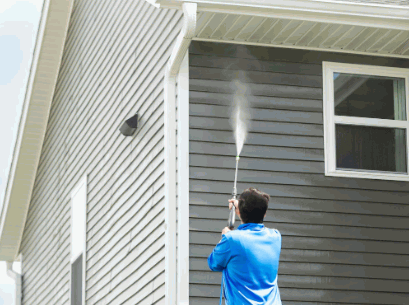
Contents
Cleaning external cladding is a crucial maintenance task that involves removing dirt, grime, and pollutants to preserve the appearance and integrity of the cladding material.
Regular cleaning of external cladding not only enhances the aesthetic appeal of the building but also plays a key role in prolonging the lifespan of the cladding material. Different cleaning methods can be employed based on the type of cladding material used.
Gain insights: What Pressure Washer For The Driveway
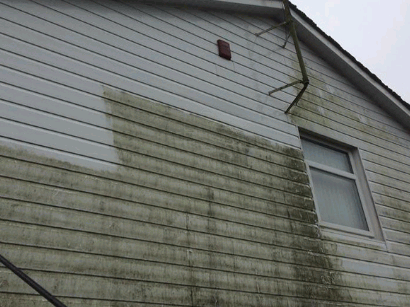
Recognising the significance of cleaning external cladding involves safeguarding against UV damage, weather deterioration, and the breakdown of protective coatings that can compromise the structural integrity of materials such as PVC cladding.
UV damage poses a considerable threat to cladding materials, leading to discolouration, fading, and degradation over time due to prolonged exposure to sunlight. Weathering, including the effects of rain, wind, and moisture, can accelerate the deterioration process, weakening the protective layers and exposing the underlying material to potential harm.
Regular maintenance routines, including cleaning and inspection, play a crucial role in preventing these adverse impacts. By removing dirt, grime, and pollutants that accumulate on the surface, maintenance can prolong the lifespan of the cladding and maintain its aesthetic appeal.
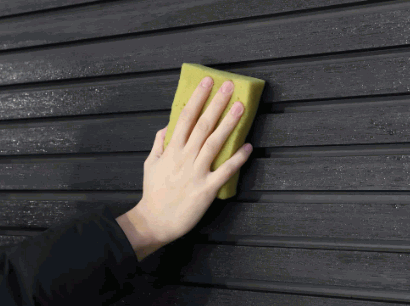
External cladding materials vary widely and can include wood, metals, and PVC cladding, each offering unique aesthetic and functional properties to enhance building exteriors.
When selecting cladding materials, factors like climate, maintenance requirements, and design preferences must be considered to ensure a cohesive and long-lasting exterior finish.

Dirty external cladding can lead to aesthetic degradation, reduced lifespan, and potential structural issues due to prolonged exposure to weather elements, underscoring the importance of regular cleaning and maintenance routines for materials like PVC cladding.
When external cladding is left uncleaned, it not only accumulates dirt, grime, and pollutants, but it is also vulnerable to mould and algae growth, which can compromise its integrity over time
The vitality of addressing cleaning interventions promptly cannot be overstated, as it not only preserves the aesthetics but also ensures the longevity and functionality of the structure.
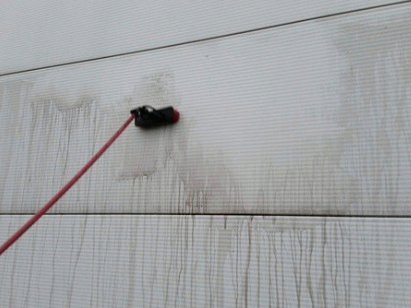
Effective cleaning of external cladding necessitates the use of specialised tools and equipment, such as hand washing implements and PVC panel cleaners, to ensure the thorough removal of dirt and contaminants without damaging the cladding surface.
To delve deeper into the essential tools required, consider having a soft-bristle brush for gentle scrubbing, microfibre cloths for wiping, and a ladder for higher sections. It is also advisable to invest in a high-quality power washer for efficient cleaning, especially for large areas. Protective gear such as gloves, safety goggles, and sturdy footwear are crucial for your safety while cleaning. Different types of cladding materials may need specific cleaners like mild detergent for aluminium and vinegar solution for brick surfaces.
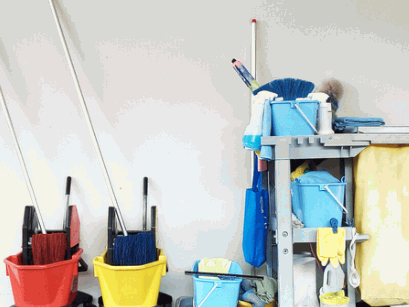
Before initiating the cleaning process for external cladding, proper preparation is essential, involving following specific instructions, assessing the cladding condition, and selecting suitable hand washing techniques for optimal results.
Following the manufacturer's guidelines for cleaning agents and procedures is crucial to avoid damage and ensure effective cleaning.
Understanding the material type of the cladding is also essential to choosing the appropriate cleaning method, whether it be pressure washing, scrubbing, or gentle wiping.
Inspecting the cladding for any signs of damage or deterioration beforehand can prevent further issues during the cleaning process. By carefully planning and executing pre-cleaning steps, one can enhance the overall appearance and longevity of external cladding.
Selecting appropriate cleaning solutions for external cladding involves considering factors like material compatibility, cleaning instructions, and the effectiveness of products such as PVCu Cream Cleaner to achieve optimal cleaning outcomes.
When choosing cleaning solutions for cladding, it is crucial to first assess the material of the cladding itself. Different materials like vinyl, metal, wood, or stone may require specific cleaners to avoid damage or discolouration. Material-specific considerations play a significant role in ensuring that the cleaning solution is compatible and safe for the surface.
Another essential aspect to keep in mind is following the manufacturer's cleaning guidelines. These guidelines provide valuable information on the recommended cleaning methods and products that are safe for the cladding material. Failure to adhere to these instructions may result in unwanted effects on the cladding's appearance and longevity.
One effective product that stands out in the market is the PVCu Cream Cleaner, designed specifically for PVCu surfaces. This specialised cleaner not only effectively removes dirt, grime, and stains but also helps restore the shiny finish of PVCu cladding without causing any damage. By using such targeted products, cleaning external cladding becomes easier and more efficient.
Enhancing the effectiveness of cleaning external cladding involves implementing practical tips, such as regular maintenance routines, proper hand washing techniques, and timely interventions to address emerging dirt or stains.
One key aspect of maintaining external cladding is to establish a consistent schedule for cleaning and inspection, ensuring any issues are identified early.
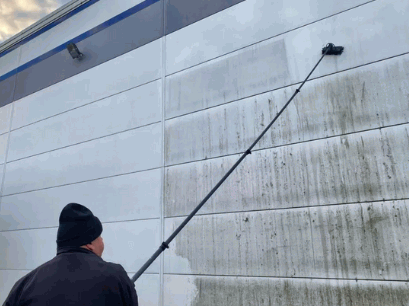
Different types of cladding, such as PVC, V Joint, and Shiplap Cladding, require specific considerations during the cleaning process to ensure material integrity and preserve the aesthetic appeal of diverse cladding styles.
In terms of PVC cladding, a gentle approach is key to prevent damage to the material's surface. Using a mild detergent solution and a soft-bristled brush can effectively remove dirt and grime without causing abrasions. V Joint cladding, on the other hand, needs extra care around the joints to avoid water seepage that may lead to structural issues. Regular inspections for gaps and resealing with appropriate sealants are crucial for maintaining its durability.
Shiplap cladding, known for its interlocking design, demands meticulous cleaning to prevent moisture buildup between the boards. A mix of warm water and vinegar can help combat mould and mildew, ensuring the longevity of this classic cladding style.
Dealing with stubborn stains on external cladding necessitates employing effective cleaning methods, following manufacturer instructions, and utilising appropriate materials to prevent damage while achieving stain removal.
One of the most crucial aspects when dealing with persistent stains on cladding surfaces is to start with a gentle approach before moving on to more abrasive measures. A common starting point is to use a mild detergent or soap solution with warm water to gently clean the affected area.
are essential steps to ensure thorough cleaning without causing any harm to the cladding. Regular maintenance plays a vital role in preventing stubborn stains from setting in, making the cleaning process more manageable and effective over time.
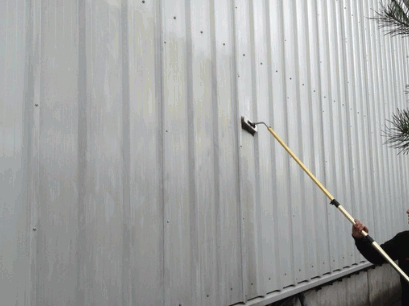
Mitigating future build-up on external cladding involves implementing preventive measures, such as regular maintenance, weather protection strategies, and proactive cleaning routines to minimise dirt accumulation and prolong cladding lifespan.
Regular maintenance plays a crucial role in preserving the aesthetics and structural integrity of the cladding. Inspecting the cladding periodically for any signs of damage or dirt accumulation can help address issues before they escalate.
Weather-proofing methods like applying specialised coatings or sealants to the cladding surface can shield it from environmental elements like rain, UV exposure, and pollutants, reducing the chances of dirt build-up and enhancing its durability.
Engaging in proactive cleaning practices, such as gentle washing with mild detergent solutions or periodic pressure washing, can help maintain the cleanliness and appearance of the cladding, preventing stubborn dirt accumulation.
Engaging professional cleaning services for external cladding can offer convenience, expertise, and quality maintenance solutions, ensuring optimal care for cladding materials and enhancing the visual appeal of properties like those managed by Gem Estate Management Company in London.
Professional cleaning services bring a specialised touch to the maintenance process, with trained professionals equipped to handle different types of cladding materials effectively. This expertise ensures that the cleaning is done efficiently without risking damage to the cladding. These services save property managers valuable time and effort, allowing them to focus on other essential tasks.
The convenience of scheduling regular cleaning appointments also helps in maintaining the aesthetic appeal of properties, creating a positive impression on visitors and tenants alike.
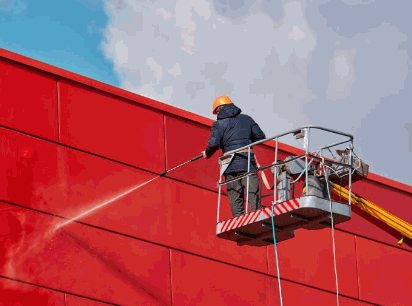
Selecting the right cleaning products for external cladding involves considering factors like material compatibility, effectiveness, and recommendations from industry experts like Graeme Ferguson to ensure optimal cleaning results and preserve cladding integrity.
In terms of material compatibility, it is crucial to match the cleaning products to the specific cladding material used, whether it's metal, wood, vinyl, or composite. Using the wrong product can damage the surface or compromise its appearance.
Effectiveness is also key - products should effectively remove dirt, grime, mould, and other debris without causing harm to the cladding.
Expert endorsements, such as those from professionals like Graeme Ferguson, can provide valuable insights into the best products for different cladding types, offering a seal of approval based on industry knowledge and experience.
Understanding the environmental impact of external cladding involves assessing factors like eco-friendly cleaning solutions, sustainable practices, and initiatives promoted by companies like Green Eco Ltd, aligned with the conservation ethos advocated by professionals like Dobromir Yankov.
In terms of eco-conscious solutions for cladding cleaning, the focus shifts towards methods that minimise harm to the environment. Companies such as Green Eco Ltd have introduced innovative approaches that utilise biodegradable cleaners and water-saving techniques to reduce the overall ecological footprint. By incorporating sustainable practices into their operations, these environmentally conscious organisations aim to set a new standard in the industry.
Professionals like Dobromir Yankov play a vital role in driving awareness about the importance of environmentally friendly cladding cleaning techniques. Their advocacy for eco-conscious initiatives has inspired many to adopt greener practices, fostering a collective movement towards sustainability and environmental stewardship. By aligning with such values and initiatives, both companies and individuals contribute to a healthier planet for future generations.
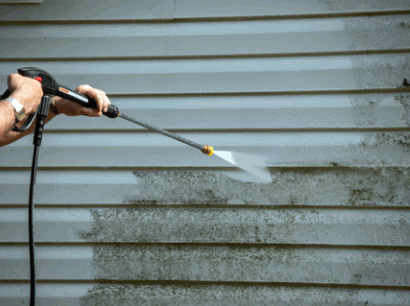
Regular cleaning and maintenance of external cladding are essential practices to preserve aesthetics, extend longevity, and uphold property values, aligning with the maintenance standards advocated by industry professionals like Tui.
External cladding plays a crucial role in enhancing the overall appeal of a building, serving as the first line of defence against external elements such as rain, snow, and UV rays.
Proper cleaning not only maintains the visual charm of the property but also prevents potential damage caused by dirt buildup and environmental pollutants.
By following the recommended maintenance schedules outlined by experts like Tui, property owners can prevent issues such as mould growth, staining, and deterioration, ensuring that their investment retains its value over time.